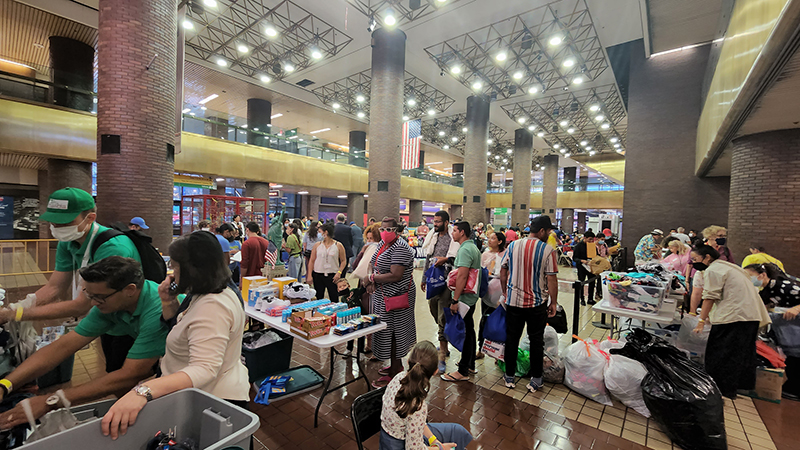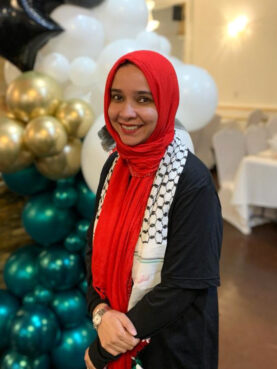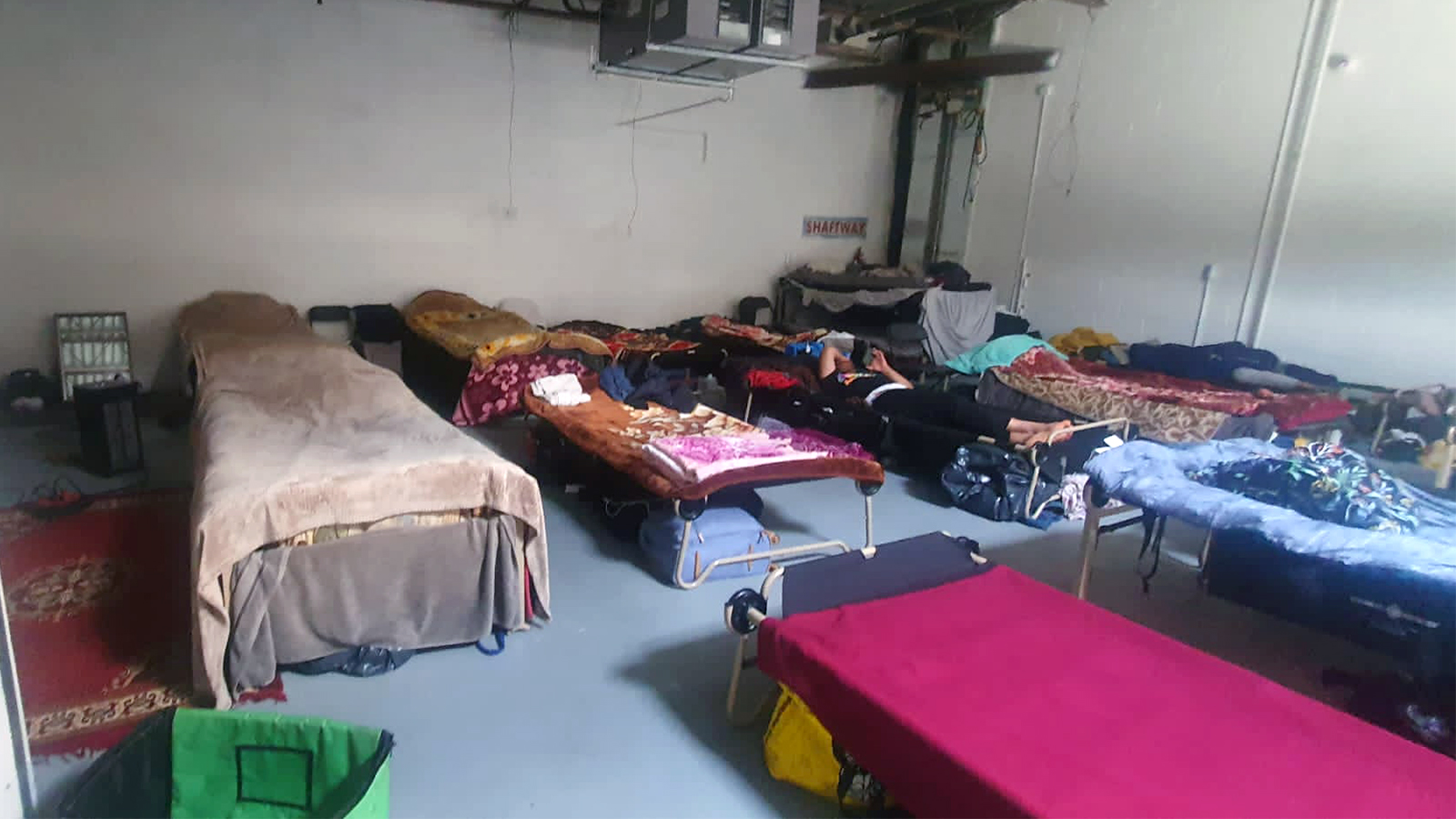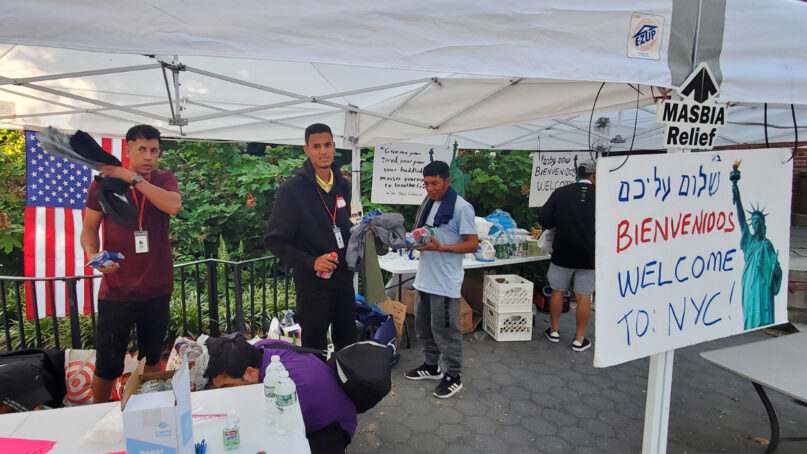NEW YORK (RNS) — Earlier this month, two marquee tents popped up in Sunset Park, Brooklyn, one of New York City’s heavily Haredi Jewish neighborhoods. Under the white canopies, marked with signs reading “Welcome and Relief Tents,” children painted tote bags with welcoming messages and volunteers were armed with flashcards to teach English as neighbors brought in food and hygiene products.
The effort, organized by Masbia Soup Kitchen Network, whose main work is providing kosher meals across Brooklyn and Queens, comes as New York Mayor Eric Adams has come under criticism for failing to properly house or feed some 100,000 migrants who have arrived in the city over the past year. In June, the city turned to faith-based organizations to sort the crisis through a shelter program called Faith Beds, which plans to accommodate 1,000 people.
“We just wanted to do what New Yorkers are meant to be doing. That’s why we have the Statue of Liberty in our harbor, to welcome immigrants,” said Alexander Rapaport, Masbia’s executive director.
Established in 2005, Masbia, a Haredi organization, has occasionally gone beyond its local mandate to help victims of the 2022 Bronx fire and, further afield, to distribute toiletries and energy drinks to soldiers guarding the U.S. Capitol on Jan. 6.
“Other people run from disaster, and we go the other direction. We go towards it,” said Rapaport.

Masbia Relief Team members distribute aid to asylum-seekers arriving at the Port Authority Bus Terminal in Manhattan, New York, on Aug. 19, 2022. Photo courtesy of Masbia
When Rapaport and his team heard that Texas Gov. Greg Abbott had sent buses carrying hundreds of migrants to New York last August, they showed up at Manhattan’s Port Authority Bus Terminal with a truck filled with items to meet basic needs.
Rapaport said helping immigrants is at the core of Jewish identity. “There are also a few times in the Bible where it says that we need to welcome the strangers because we need to remember that we were strangers in the land of Egypt,” he said.
As the migrant crisis continued and people kept coming, Masbia deployed food distribution volunteers in the lobbies of hotels-turned-shelters. Rapaport said the group is still committed to serve the new arrivals but admits he didn’t expect the situation to last this long.
“They are constantly new people coming and showing up, so there is a constant crisis,” he said.

Soniya Ali. Photo courtesy of Muslim Community Center
Sunset Park’s Muslim Community Center, whose members also flocked to the Port Authority last August to offer migrants temporary shelters in the mosque’s prayer rooms, have also expanded their capacity as the flow of people remains steady.
“We didn’t even think about it like long term. It was just like, ‘OK, let’s house them.’ It wasn’t something we thought would be (doing) for almost a year,” said Soniya Ali, director of the center, sitting in its new women’s prayer room. (The women’s former space is now filled with 19 beds.)
Ali originally connected with the migrants through Adama Bah, a former asylum-seeker from Guinea who now advocates for displaced people. “Some people stay for a couple of nights, and then they have to move on to a different space, a different city, a different state,” said Ali. Others have also managed to stay longer-term in the city and join the community for Friday’s jumah prayer, she explained.
Early in the summer, Ali applied to the new faith-based shelter program, coordinated by New York Disaster Interfaith Services, which has been awarded $75 million to support 50 houses of worship and other faith-based organizations willing to house and provide meals, clothes and other services to 19 migrants each.
“Through our hard times and difficult crises, our faith leaders and communities have been there for New Yorkers over and over again. We believe this is the step in another direction that we can help address this crisis that we are facing,” the mayor said at a June news conference.
The Muslim Community Center’s application is still under consideration, but if it is approved Ali plans to use the funds to pay salaries for shelter staff. The program requires houses of worship to have a janitor, security guard and administrator. But Faith Beds won’t pay for the mosque to install a required sprinkler system.

The Muslim Community Center in Sunset Park, Brooklyn, has converted prayer rooms into temporary shelter for migrants. Photo courtesy of Muslim Community Center
Ali isn’t sure the extra funds are worth the investment or the disruption, as the shelter is already functioning as it is. She was told that program coordinators were looking for a solution to the extra expenses, as many other houses of worship faced the same problem.
Calls to the New York Disaster Interfaith Services and the director of the Faith-Based and Community Partnerships office were not returned.
As they await the NYDIS’ decision on their application, the mosque’s members continue to provide help here and there and bring food and clothes for migrants.
Other organizations have tackled needs beyond beds. The Buddhist Tzu Chi Foundation is providing eye care to migrants who arrived in the city without insurance coverage, working out of two vans converted into mobile vision clinics that park outside the city’s shelters.
In mid-August, Dr. James Chuang and 15 volunteers offered free eye exams and created eyeglasses on the spot in the parking lot of a shelter on Long Island.
“We saw 21 patients that day, and I believe we were able to provide everyone with a pair of eyeglasses,” said Chuang, whose family was among the early members of Tzu Chi. Soon, the foundation will have its dental clinic van.
Adams has saluted the foundation’s work, said Chuang, who also takes pride in the fact that the work is entirely supported by donations.
“It’s always good to give back. We never realize how good we are until we go out and realize that others may not have as much as we do,” he said.





